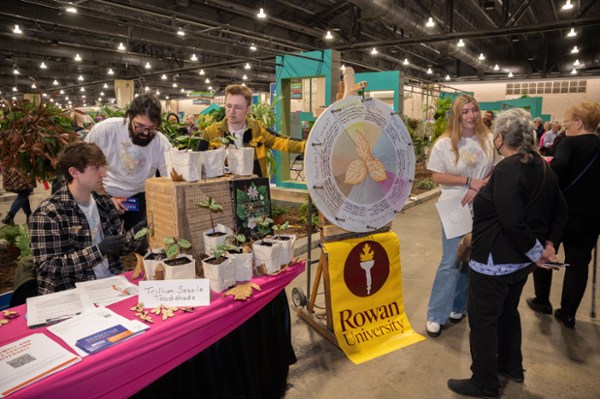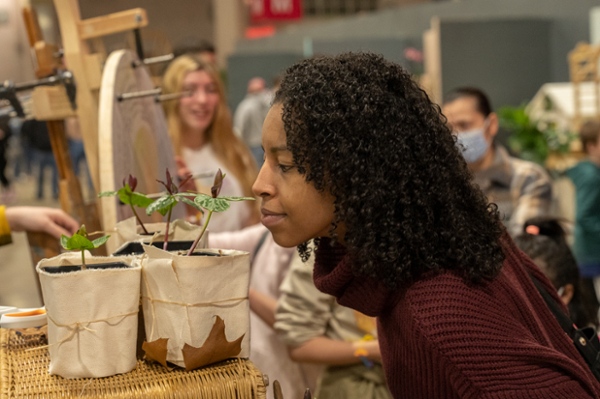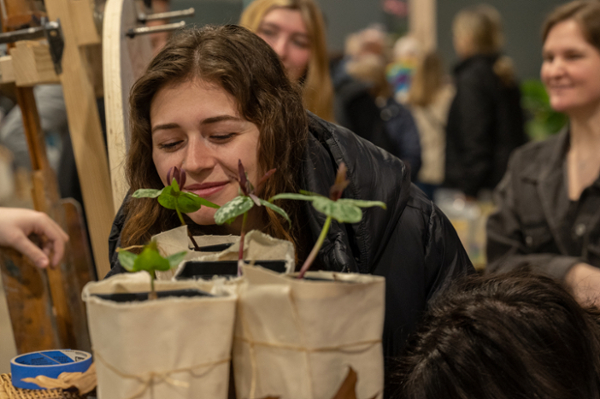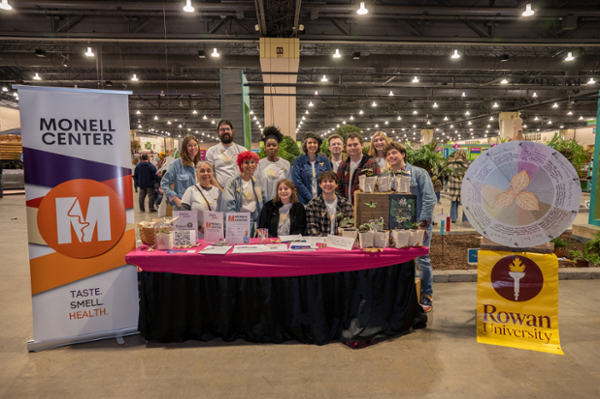Rowan faculty and students team with Monell scent specialists for Flower Show “smell fan”
Rowan faculty and students team with Monell scent specialists for Flower Show “smell fan”
The final day of the Philadelphia Flower Show practically exploded with scents of spring March 12, and at a display hosted by Rowan University faculty and students, visitors learned about – and experienced – the odiferous components that make up the smell of an important but endangered native plant.
Faculty Donna Sweigart and Jennifer Kitson partnered with the Monell Chemical Senses Center in Philadelphia to create a “smell fan,” a boardwalk-style wheel-of-chance. Visitors spun the fan, and where it stopped determined which part of the complex trillium bouquet they’d sniff from a perfumed paper strip.
Most of which, but not all, were pleasant, ranging from “floral light” (notes of honey, sweetness and butter) to “spice” (clove, ginger and cinnamon), to “animalic” (scents of yeast, musk and fishiness).
“It smells nice,” said Emily Uhler, a Drexel University student whose spin landed on “spice.”
Sweigart, Kitson and their partners at Monell said the complex, fragrant trillium is favored by deer but endangered by overdevelopment and climate change. Monell staff worked with Kitson and Sweigart to explain the project and the plant’s chemical properties that the human sense of smell responds to.
Sweigart, an associate professor in the Ric Edelman College of Communication & Creative Arts, said the Rowan team forced trillium to bloom early on campus so Flower Show visitors could experience the plant’s many floral properties.
“We’re showcasing trillium because they are a native, woodland flower that’s becoming endangered,” Sweigart said. “It’s part of a larger project on campus including an upcoming scent-tennial.”
The “scent-tennial” will be a walking tour that’s planned to complement Rowan’s centennial celebration this year, Sweigart said.
Kitson, an associate professor with a dual appointment in the Edelman CCCA and the School of Earth & Environment, said ahead of the Flower Show they successfully force-bloomed Trillium sessile, which they found to smell fruity and sweaty. They’re currently growing Trillium erectum, which purportedly smells like wet dog, and Trillium luteum, which smells lemony and sweet.
“As a geographer, I’m interested in smell as an environmental sense,” Kitson said.
Ironically, she noted, the smells most associated with spring in the Mid-Atlantic region, like those from tulips, daffodils and hyacinths, come from Asia, Europe and the Middle East, respectively.
“Those are all non-native species,” Kitson said. “The trillium is native but most people have never smelled one.”
Kitson and Sweigart said they created the smell fan to educate visitors about the complex, native trillium plant and to raise awareness about the threat it faces in the wild.
They also gave out free wooden trillium pins to “inspire people to get outdoors, sniff and celebrate spring ephemerals in the region,” Kitson said. “By showcasing the scents of native plants, our goal is to increase awareness about the role and importance of smell for people, plants and pollinators.”
Based in Philadelphia, the Monell Center is an independent research institute that studies the biology of taste, smell and the related senses.
Monell scent scientist Bob Pellegrino said the institute researches a wide range of scents and the powerful effects they can have on the human experience.
Like the burnt smell of firewood evoking a family camping trip decades before, “scents can trigger memories from childhood,” he said.
As part of the program, Monell staff asked visitors to take actions related to the scents of spring, health and well-being. Actions included participation in a study comparing smell tests and signing an online petition to bring awareness to the need for a clinical routine test for smell, which would be akin to hearing and vision tests, throughout one's lifetime.



